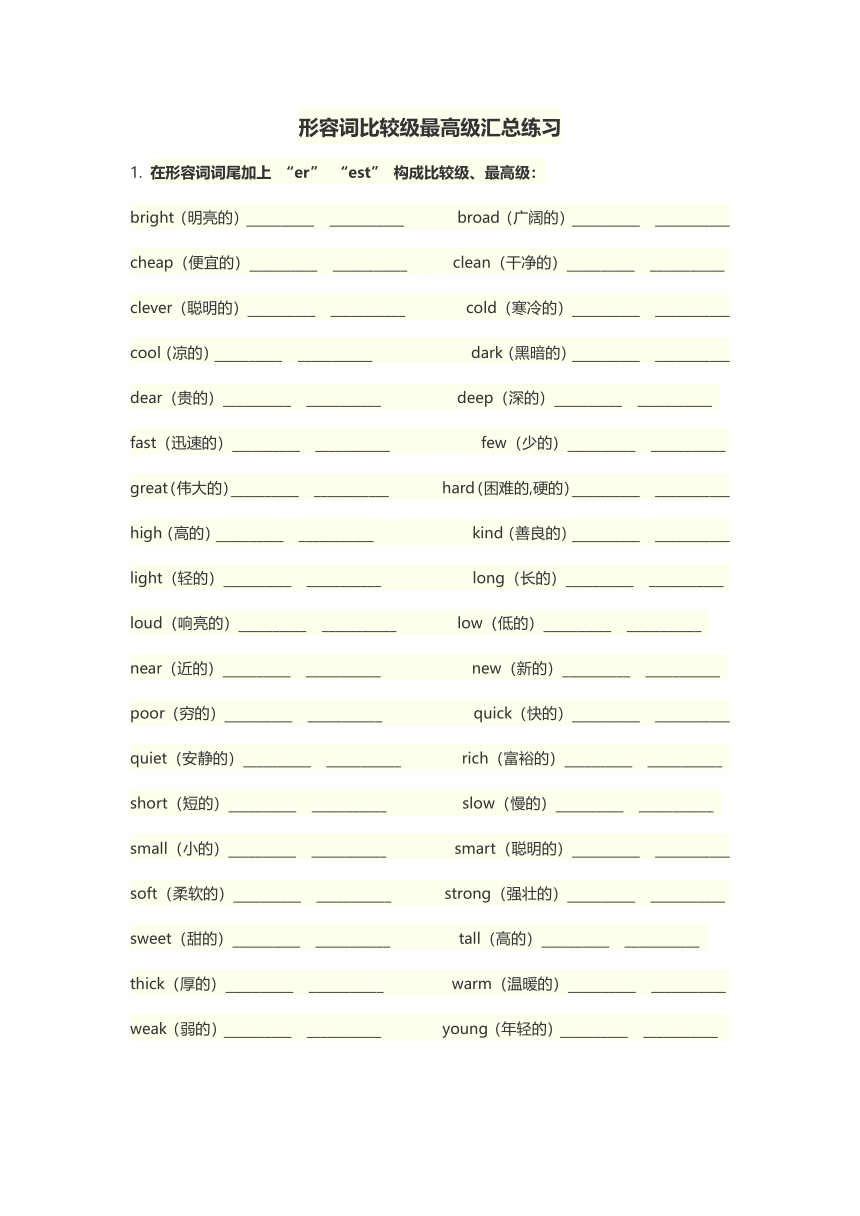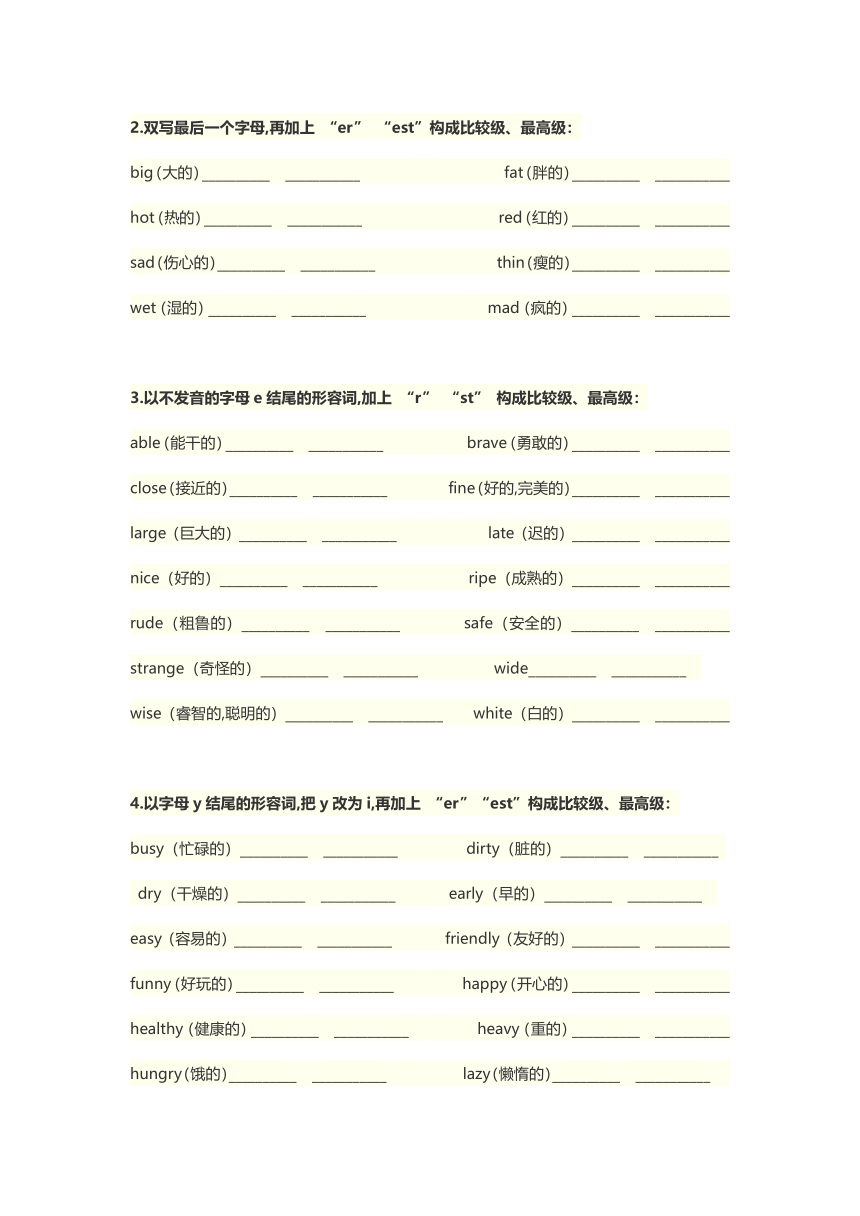初中英语比较级最高级单词练习表格
文档属性
| 名称 | 初中英语比较级最高级单词练习表格 |  | |
| 格式 | zip | ||
| 文件大小 | 37.0KB | ||
| 资源类型 | 试卷 | ||
| 版本资源 | 人教新目标(Go for it)版 | ||
| 科目 | 英语 | ||
| 更新时间 | 2021-09-16 22:05:32 | ||
图片预览


文档简介
形容词比较级最高级汇总练习
1.
在形容词词尾加上
“er”
“est”
构成比较级、最高级:
bright(明亮的)__________
___________
broad(广阔的)__________
___________
cheap(便宜的)__________
___________
clean(干净的)__________
___________
clever(聪明的)__________
___________
cold(寒冷的)__________
___________
cool(凉的)__________
___________
dark(黑暗的)__________
___________
dear(贵的)__________
___________
deep(深的)__________
___________
fast(迅速的)__________
___________
few(少的)__________
___________
great(伟大的)__________
___________
hard(困难的,硬的)__________
___________
high(高的)__________
___________
kind(善良的)__________
___________
light(轻的)__________
___________
long(长的)__________
___________
loud(响亮的)__________
___________
low(低的)__________
___________
near(近的)__________
___________
new(新的)__________
___________
poor(穷的)__________
___________
quick(快的)__________
___________
quiet(安静的)__________
___________
rich(富裕的)__________
___________
short(短的)__________
___________
slow(慢的)__________
___________
small(小的)__________
___________
smart(聪明的)__________
___________
soft(柔软的)__________
___________
strong(强壮的)__________
___________
sweet(甜的)__________
___________
tall(高的)__________
___________
thick(厚的)__________
___________
warm(温暖的)__________
___________
weak(弱的)__________
___________
young(年轻的)__________
___________
?
2.双写最后一个字母,再加上
“er”
“est”构成比较级、最高级:
big(大的)__________
___________
fat(胖的)__________
___________
hot(热的)__________
___________
red(红的)__________
___________
sad(伤心的)__________
___________
thin(瘦的)__________
___________
wet(湿的)__________
___________
mad(疯的)__________
___________
3.以不发音的字母e结尾的形容词,加上
“r”
“st”
构成比较级、最高级:
able(能干的)__________
___________
brave(勇敢的)__________
___________
close(接近的)__________
___________
fine(好的,完美的)__________
___________
large(巨大的)__________
___________
late(迟的)__________
___________
nice(好的)__________
___________
ripe(成熟的)__________
___________
rude(粗鲁的)__________
___________
safe(安全的)__________
___________
strange(奇怪的)__________
___________
wide__________
___________
wise(睿智的,聪明的)__________
___________
white(白的)__________
___________
4.以字母y结尾的形容词,把y改为i,再加上
“er”“est”构成比较级、最高级:
busy(忙碌的)__________
___________
dirty(脏的)__________
___________
dry(干燥的)__________
___________
early(早的)__________
___________
easy(容易的)__________
___________
friendly(友好的)__________
___________
funny(好玩的)__________
___________
happy(开心的)__________
___________
healthy(健康的)__________
___________
heavy(重的)__________
___________
hungry(饿的)__________
___________
lazy(懒惰的)__________
___________
?
lucky(幸运的)__________
___________
silly(傻的)__________
___________
noisy(嘈杂的)__________
___________
pretty(美丽的)__________
___________
naughty(调皮的)__________
___________
spicy(辣的)__________
___________
thirsty(渴的)__________
___________
ugly(丑的)__________
___________
5.双音节、多音节形容词,在单词前面加上
“more”
“most”构成比较级、最高级:
afraid(害怕的)_______________________
_______________________
beautiful(美丽的)_______________________
_______________________
careful(仔细的)_______________________
_______________________
cheerful(开心的)_______________________
_______________________
?
crowded(拥挤的)_______________________
_______________________
dangerous(危险的)_______________________
_______________________
?
delicious(美味的)_______________________
_______________________
difficult(困难的)_______________________
_______________________
exciting(令人兴奋的)_______________________
_______________________
expensive(昂贵的)_______________________
_______________________
famous(著名的)_______________________
_______________________
frightened(受惊的)_______________________
_______________________
frightening(令人害怕的)_______________________
_______________________
hard-working(勤奋的)_______________________
_______________________
helpful(有帮助的)_______________________
_______________________
honest(诚实的)_______________________
_______________________
important(重要的)_______________________
_______________________
interesting(有趣的)_______________________
_______________________
?
polite(有礼貌的)_______________________
_______________________
terrible(可怕的)_______________________
_______________________
?
tired(累的)_______________________
_______________________
6.不规则变化的形容词:
bad(坏的)—worse—worst?
far(远的)—farther—farthest
(far—further—furthest)?
good(好的)—better—best?
well(好的,身体好的)—better—best
ill(病的)—worse—worst?
little(少的)—less—least?
many(多的)—more—most
much(多的)—more—most?
old(年老的)—older—oldest
(
old—elder—eldest)
1.
在形容词词尾加上
“er”
“est”
构成比较级、最高级:
bright(明亮的)__________
___________
broad(广阔的)__________
___________
cheap(便宜的)__________
___________
clean(干净的)__________
___________
clever(聪明的)__________
___________
cold(寒冷的)__________
___________
cool(凉的)__________
___________
dark(黑暗的)__________
___________
dear(贵的)__________
___________
deep(深的)__________
___________
fast(迅速的)__________
___________
few(少的)__________
___________
great(伟大的)__________
___________
hard(困难的,硬的)__________
___________
high(高的)__________
___________
kind(善良的)__________
___________
light(轻的)__________
___________
long(长的)__________
___________
loud(响亮的)__________
___________
low(低的)__________
___________
near(近的)__________
___________
new(新的)__________
___________
poor(穷的)__________
___________
quick(快的)__________
___________
quiet(安静的)__________
___________
rich(富裕的)__________
___________
short(短的)__________
___________
slow(慢的)__________
___________
small(小的)__________
___________
smart(聪明的)__________
___________
soft(柔软的)__________
___________
strong(强壮的)__________
___________
sweet(甜的)__________
___________
tall(高的)__________
___________
thick(厚的)__________
___________
warm(温暖的)__________
___________
weak(弱的)__________
___________
young(年轻的)__________
___________
?
2.双写最后一个字母,再加上
“er”
“est”构成比较级、最高级:
big(大的)__________
___________
fat(胖的)__________
___________
hot(热的)__________
___________
red(红的)__________
___________
sad(伤心的)__________
___________
thin(瘦的)__________
___________
wet(湿的)__________
___________
mad(疯的)__________
___________
3.以不发音的字母e结尾的形容词,加上
“r”
“st”
构成比较级、最高级:
able(能干的)__________
___________
brave(勇敢的)__________
___________
close(接近的)__________
___________
fine(好的,完美的)__________
___________
large(巨大的)__________
___________
late(迟的)__________
___________
nice(好的)__________
___________
ripe(成熟的)__________
___________
rude(粗鲁的)__________
___________
safe(安全的)__________
___________
strange(奇怪的)__________
___________
wide__________
___________
wise(睿智的,聪明的)__________
___________
white(白的)__________
___________
4.以字母y结尾的形容词,把y改为i,再加上
“er”“est”构成比较级、最高级:
busy(忙碌的)__________
___________
dirty(脏的)__________
___________
dry(干燥的)__________
___________
early(早的)__________
___________
easy(容易的)__________
___________
friendly(友好的)__________
___________
funny(好玩的)__________
___________
happy(开心的)__________
___________
healthy(健康的)__________
___________
heavy(重的)__________
___________
hungry(饿的)__________
___________
lazy(懒惰的)__________
___________
?
lucky(幸运的)__________
___________
silly(傻的)__________
___________
noisy(嘈杂的)__________
___________
pretty(美丽的)__________
___________
naughty(调皮的)__________
___________
spicy(辣的)__________
___________
thirsty(渴的)__________
___________
ugly(丑的)__________
___________
5.双音节、多音节形容词,在单词前面加上
“more”
“most”构成比较级、最高级:
afraid(害怕的)_______________________
_______________________
beautiful(美丽的)_______________________
_______________________
careful(仔细的)_______________________
_______________________
cheerful(开心的)_______________________
_______________________
?
crowded(拥挤的)_______________________
_______________________
dangerous(危险的)_______________________
_______________________
?
delicious(美味的)_______________________
_______________________
difficult(困难的)_______________________
_______________________
exciting(令人兴奋的)_______________________
_______________________
expensive(昂贵的)_______________________
_______________________
famous(著名的)_______________________
_______________________
frightened(受惊的)_______________________
_______________________
frightening(令人害怕的)_______________________
_______________________
hard-working(勤奋的)_______________________
_______________________
helpful(有帮助的)_______________________
_______________________
honest(诚实的)_______________________
_______________________
important(重要的)_______________________
_______________________
interesting(有趣的)_______________________
_______________________
?
polite(有礼貌的)_______________________
_______________________
terrible(可怕的)_______________________
_______________________
?
tired(累的)_______________________
_______________________
6.不规则变化的形容词:
bad(坏的)—worse—worst?
far(远的)—farther—farthest
(far—further—furthest)?
good(好的)—better—best?
well(好的,身体好的)—better—best
ill(病的)—worse—worst?
little(少的)—less—least?
many(多的)—more—most
much(多的)—more—most?
old(年老的)—older—oldest
(
old—elder—eldest)
同课章节目录
- Unit 1 Where did you go on vacation?
- Section A
- Section B
- Unit 2 How often do you exercise?
- Section A
- Section B
- Unit 3 I'm more outgoing than my sister.
- Section A
- Section B
- Unit 4 What's the best movie theater?
- Section A
- Section B
- Unit 5 Do you want to watch a game show?
- Section A
- Section B
- Unit 6 I'm going to study computer science.
- Section A
- Section B
- Unit 7 Will people have robots?
- Section A
- Section B
- Unit 8 How do you make a banana milk shake?
- Section A
- Section B
- Unit 9 Can you come to my party?
- Section A
- Section B
- Unit 10 If you go to the party, you'll have a grea
- Section A
- Section B
